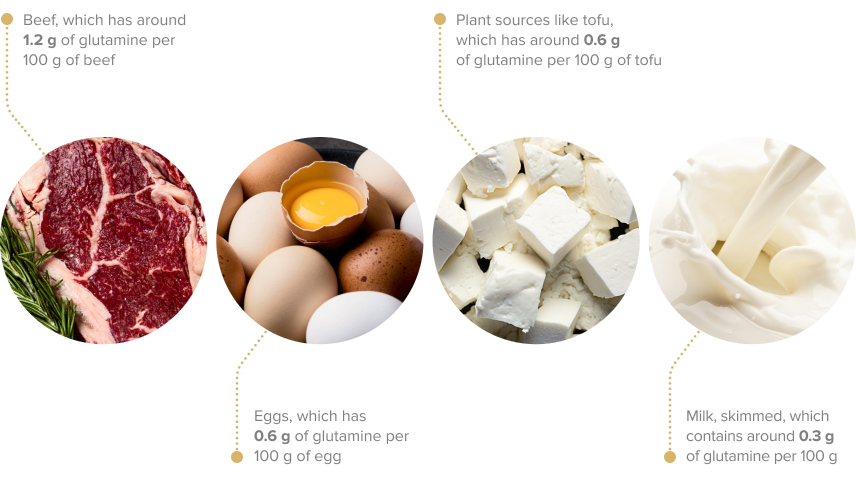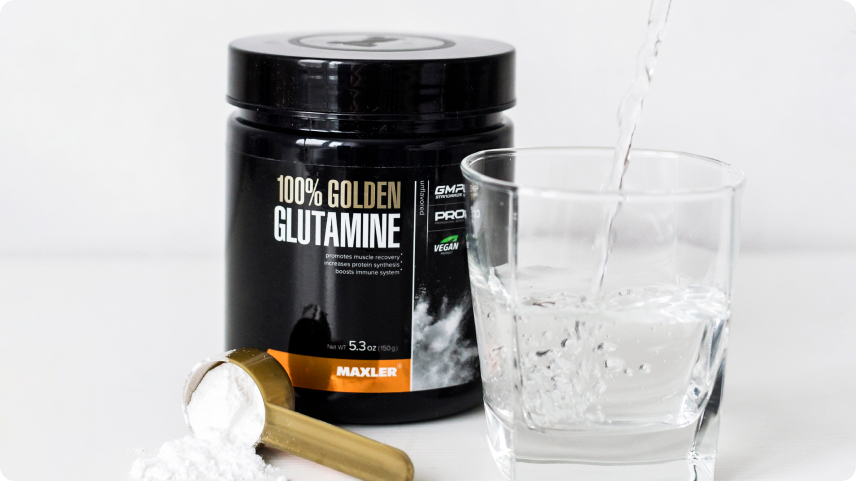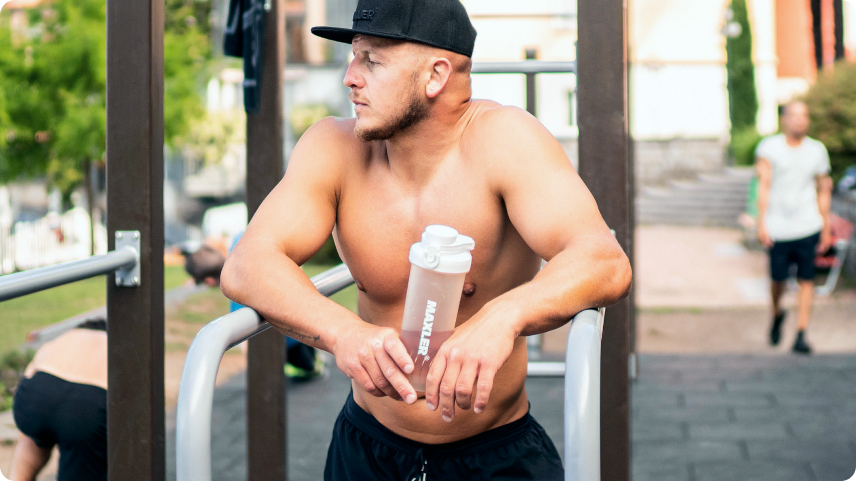Almost everyone’s heard of protein; we know it consists of amino acids. Your overall protein intake is essential, especially if you’re supporting your muscle mass or leading an active life. But is there ever a time when you should consider adding specific amino acids to your routine on their own?
Indeed, there is. Certain amino acids can be great for more than just your muscle tone. One of these is glutamine.
What Is Glutamine?
Glutamine is an amino acid. This amino acid is actually the most common one in the body. We’re able to make it ourselves. However, there are times when we need more glutamine than we can make. In those cases, it becomes a conditionally essential amino acid.
Glutamine, in nature, exists in two forms – l-glutamine and d-glutamine. The two differ in the arrangement of their atoms. Our body mainly uses l-glutamine in its processes.
Glutamine plays a role in many processes in the body, so there are many different benefits to glutamine.
Health Benefits
Glutamine benefits are quite wide-reaching in terms of the body.
Glutamine is well-known for its role in immune system function. Our immune cells rely on glutamine as their fuel source, especially the white blood cells called neutrophils. These cells are our first line of defence. In addition, it supports cell division and tissue repair and helps our immune cells recognize pathogens. That’s why it’s also often given to people who are very ill in medical settings.
Another setting that it shines in is weight management. Some people take additional glutamine for weight loss. It turns out that glutamine may be able to support the action of insulin. This can help reduce fat mass and waist circumference in overweight people.
Glutamine can benefit athletes. Glutamine is a super-star for recovery, supporting both immune and muscle recovery. It decreases muscle damage, can support protein synthesis, and may lower feelings of soreness.
Glutamine is also great for our gut. It can support our gut microbiome and gut wall integrity and can help lower inflammatory responses. In addition, it may be able to support our mood and brain health through the gut-brain axis.
Sources of Glutamine
Can you get this amino acid from the foods you eat? Absolutely. We naturally get around 3-6 grams of glutamine daily from the foods we eat.
As glutamine is an amino acid, you can find it in protein-rich foods. Some good examples of protein-rich foods include:
- Beef, which has around 1.2 grams of glutamine per 100 grams of beef.
- Eggs, which has 0.6 grams of glutamine per 100 grams of egg.
- Milk, skimmed, which contains around 0.3 grams of glutamine per 100 grams.
- Plant sources like tofu, which has around 0.6 grams of glutamine per 100 grams of tofu.
Some foods can be high in glutamine but lower in protein content. These foods include plant sources like corn and white rice.
Alternatively, if you want to increase your glutamine intake but are struggling with getting it from whole foods, a supplement might help.
Supplementation
Glutamine is available as a supplement, usually as glutamine powder. Supplements can be a convenient way to meet your glutamine needs, especially if your diet or time is limited. For example, those who are ill might need extra glutamine but may find it hard to stomach a full meal. A drink with powdered glutamine may be a great choice in that case.
Glutamine supplementation can be an attractive option for those with a busy schedule. For example, athletes who need to recover quickly before the next training session or match may benefit from additional glutamine.
But how do you choose a glutamine supplement?
It’s essential to do your research when choosing a supplement. Some of the things to look out for include:
- Can you trust the product quality? Choose high-quality supplements, especially those whose manufacturers are clear about their standards. All Maxler supplements are manufactured in IFS and GMP-certified factories. This allows us to ensure that the products meet the highest quality standards.
- Does the supplement fit your lifestyle? Seek glutamine supplements that are in line with your dietary needs and restrictions. For example, Maxler 100% Golden Glutamine is a vegan supplement, meaning that it will suit most people!
- What benefits do you want from the supplement? Your supplement dosage and type may depend on what you’re trying to achieve. For those wanting a higher dose, a powder may be more beneficial than a tablet.
- Do you need additional ingredients? Additional ingredients may be beneficial for those looking to improve recovery. You may want to choose a supplement with both BCAAs and Glutamine.
As with any supplement, feel free to experiment to find what type and dosage of glutamine works best for you.
How to Take Glutamine Properly
Taking additional glutamine means you’re likely to be taking a supplement in either a powder or a tablet form.
Before starting any supplementation, it’s necessary to make sure you consult with your practitioner. They will be able to advise you on whether there’s anything you may need to watch out for, for example, interactions with medication. Therefore, check in with them before changes to your diet and supplement routine.
However, if you’re all clear to go, how can you take glutamine supplements?
Glutamine supplements can be taken in a variety of doses. Most studies use around 5 grams a day to around 45 grams. You’re likely better off sticking to anything in the 3–14-gram range as a supplement.
It appears to be safe when taken in the short term. Therefore, when using glutamine, take it for around 4-6 weeks. You may be able to cycle it rather than take it continuously for a long time.
The reason for this is that we don’t yet understand how long-term glutamine consumption affects the body. It may change how the body processes amino acids, but more research has to be done first.
When taking a glutamine supplement, use the supplement according to the directions on the label. For powders, you can mix the supplement with water or foods like yoghurt or applesauce.
What special dietary instructions should I follow?
Do you need to completely change your diet when you’re taking l-glutamine? The short answer is no.
However, if you’re taking the supplement for a specific reason, you can alter your diet to help you achieve your overall goal.
For example, those taking glutamine for immune system support, especially endurance athletes, can eat to boost immunity. This involves getting more foods that contain vitamins D, C, and E. Therefore, you might consider enriching your diet with fish, citrus fruit, vitamin D-enriched mushrooms, bell peppers, and almonds. In addition, make sure you’re meeting your protein goals.
To learn more about eating for immunity, check out our post on the immunity-boosting diet. You can also learn more about what our immune system is made of and how it works.
This will also apply to those who want to use glutamine to help them lose weight. If that sounds like you, check out our post on how to lose weight safely and fast.
Potential Risks and Side Effects
Glutamine is an amino acid naturally found in many foods. However, when taken as a supplement, the dosages may be higher than what you’d find in food. Therefore, it’s important to note that side effects are possible.
Luckily, most side effects are mild. For example, some people may experience bloating, nausea, upset stomach and heartburn.
Remember to always check with your practitioner or coach before starting a new supplement. And listen to your body – there’s no point in forcing yourself to take a supplement that causes stomach discomfort.
Glutamine is a naturally occurring amino acid. It has many benefits, including supporting recovery, immunity, and gut health. Therefore, some people may find glutamine supplementation a valuable tool in reaching their performance and health goals. Remember to choose your glutamine supplements carefully and pair them with a healthy and active lifestyle. Supplements are great tools to help you succeed, but an active lifestyle and consistency will be the key to getting you there.









